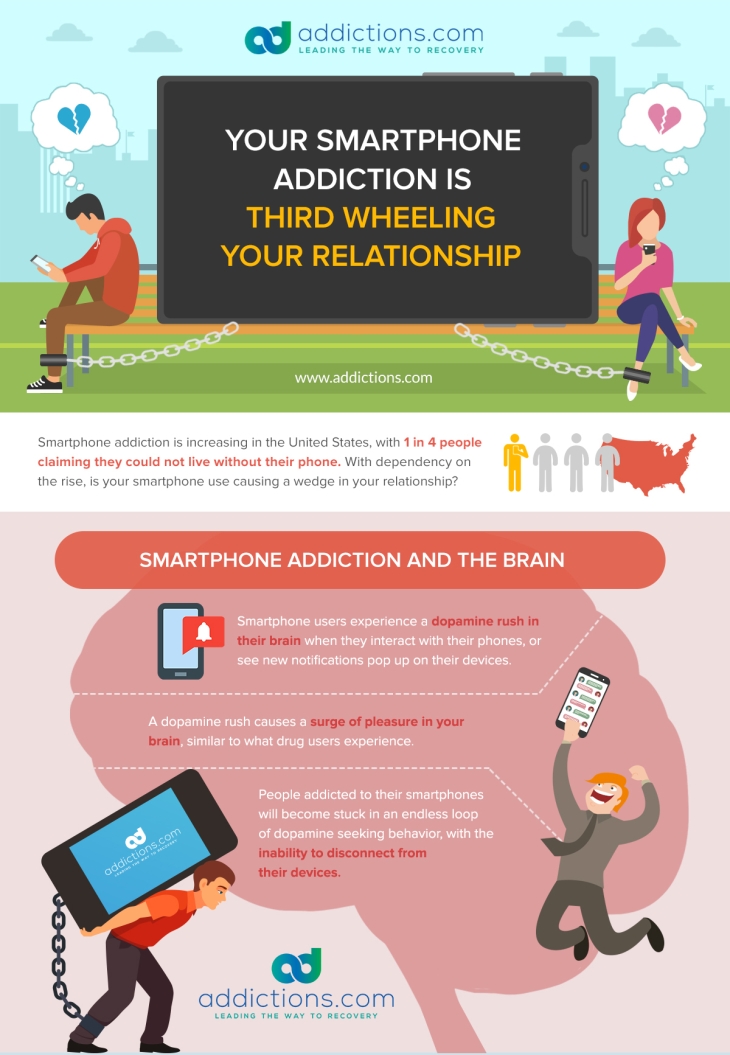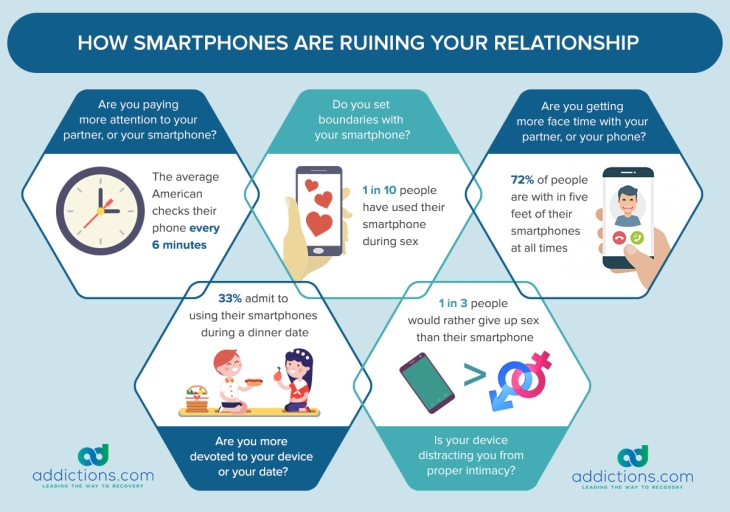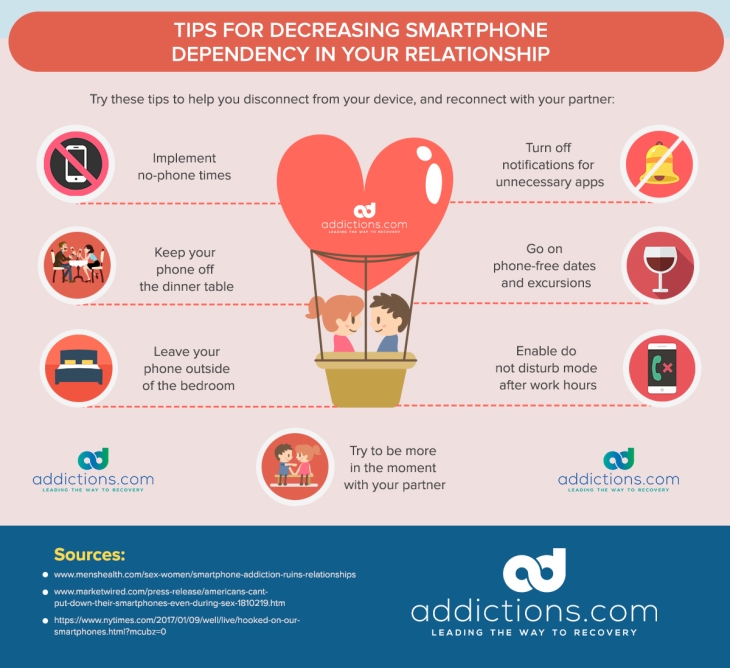Americans check their smartphones approximately once every six minutes, which equals 150 times a day. It seems that almost everyone is dependant upon their smartphone—46% of Americans say that they “couldn’t live without” their devices. So, it should be no surprise that smartphone relationship problems have joined the ranks of the classic top three sources of dating and marriage conflict: money, sex, and children.
Smartphone dependency and smartphone addiction are taking a toll on relationships everywhere, and some would even pick their device over the relationship if forced to choose between the two. A recent University of Maryland study found that one in three individuals would rather give up sex than their smartphones.
This dependency is so widespread, partly because very few people have the choice to “opt out” of internet life and all the accompanying devices. Our work, social, and family lives depend upon email, texts, and internet access, and we are expected to be able to connect to these things at all time through our smartphones. This means we carry our addiction triggers with us everywhere we go—we have to.
In some ways, smartphones can enhance relationships. The ease of staying in touch with a partner through texts, calls, and Face Time can strengthen relationship bonds by maintaining intimacy through busy days and long distances. On the other hand, people have difficulty truly connecting face to face when one or both partners is distracted by the constant urge to check their phone.
People today use their smartphones all the time, everywhere. Thirty-five percent report using them in a movie theater, thirty-two percent use them at a function for their child or school, and thirty-three percent use them during dinner dates. Naturally, this degree of smartphone obsession gets in the way of intimacy.
Seven Ways That Smartphone Addiction is Getting in the Way of Your Relationship
1. Phubbing
This mashup term derived from “phone-snubbing,” refers to times when you become distracted by your phone, and your partner feels snubbed or rejected. It has become one of the major sources of relationship conflict in recent years.
2. Miscommunication
When you are constantly distracted by your phone, you will literally miss what your partner is saying. This will not only show thoughtlessness towards your partner, it can lead to misunderstandings and miscommunications that can cause all kinds of problems—from failing to show up to an event your partner thought you’d agreed to come to, to failing to recognize when your partner is trying to tell you something important, and responding inappropriately or not at all.
3. Time and energy suck
Smartphone overuse can be a major drain on time and energy that you could be spending on your partner. It can result in a pattern of consistent neglect that drives a wedge between you.
4. Less sex, and/or worse sex
Many people report not wanting to stop what they’re doing on their smartphone to have sex with their partners, and nine percent (that’s nearly one in ten) of people in a recent Harris Interactive survey admit to having actually used their smartphones during sex. This rate climbs to twenty percent, or one in five, when you limit the data to individuals between age 18 and 34.
5. More insecurity and less satisfaction
A recent study from the University of Arizona, published in Psychology of Popular Media Culture found that individuals with smartphone dependent or addicted partners were far less happy in their relationships. The higher the level of smartphone dependency within a couple, the higher the level of relationship uncertainty, and the lower the level of relationship satisfaction.
6. Self-centeredness
A recent UK study found that spending a lot of time on social media encourages self-absorption and narcissism. Getting caught up in displaying yourself in a certain way online, chasing acknowledgement from others, competing to get more followers or to win online arguments, etc., can lead to an unhealthy level of self-centeredness.
7. Distance from your partner
Constant smartphone usage and distraction isolates people from their partners, making them feel like they have to compete with technology for attention—or that they can’t compete, so why even stay in the relationship?
The University of Arizona study concludes that it isn’t smartphone use itself that negatively impacts relationships, but rather the “psychological reliance on these devices.” In other words, regularly using your smartphone won’t get in the way of your love life, but smartphone dependency and smartphone addiction will.
America, Land of the Smartphone Addicted
Most Americans are attached to their smartphones—almost literally. We take our phones everywhere we go, and start to get panicky when we are more than five feet away from our devices. For most people, this is related to a fear of having our privacy invaded or our personal information stolen, but for many, panic would set in regardless of whether the phone was left out on a restaurant table, or was shut off and safely locked inside a hotel safe.
This kind of panic usually comes from the fear of missing out. This smartphone-related FOMO is so common that it has, in fact, been given a nickname— “nomophobia,” the fear of not having your mobile phone. And while the name is cute, the addiction itself is serious. Smartphone addiction is a behavioral addiction, similar to compulsive gambling.
Signs of Smartphone Addiction
Just like alcohol or drugs, smartphones can stimulate the release of dopamine, a neurotransmitter associated with pleasure, emotions, motivation, and movement. Dopamine makes us feel good, and our brains reward us with it to reinforce life-sustaining activities such as eating food and taking care of ourselves. But some activities release extra amounts of dopamine through over-stimulation (like the constantly changing forms of distraction accessible through a smartphone), causing the user to develop a tolerance that drives them to increase the amount of time spent on the activity just to experience the same degree of pleasure.
Tolerance is a sign of smartphone addiction, as is compulsively checking your phone, and experiencing withdrawal symptoms when you attempt to cut down or quit. These symptoms may also appear when you are simply without wi-fi, or in an area without cell service.
Withdrawal symptoms include: panic, anxiety, restlessness, hostility, irritability, anger, depression, difficulty concentrating, and intense cravings for device usage.
Other signs of smartphone addiction include:
- Using your phone in situations where you know you shouldn’t, such as while driving, attending an important event, or having sex.
- Spending so much time on your phone that you neglect relationships, family responsibilities, work, school, or any other activity or hobby that is important to you.
- Prioritizing online relationships and social media feedback over face to face interactions.
- Hiding and lying about smartphone use.
- Getting cranky when your smartphone time is interrupted.
- Getting hostile when someone brings up how much time or energy you devote to your smartphone.
- Feeling panicky at the idea of missing out on news, texts, social media happenings or anything else your phone can connect you to.
- Getting up at night to check your phone.
- Feeling phantom phone vibrations—imagining that you are getting a notification, text, email or call when you actually aren’t.
The Cost of Smartphone Addiction
Many people use their phones to cope with or escape from deeper problems such as loneliness, depression, anxiety, or stress, but smartphone addiction can also exacerbate or even cause such emotional problems. For example, you may tweet something funny, hoping to get enough responses, likes, and retweets to make you feel better about yourself, then wind up feeling worse if your tweet is ignored, or causes a negative backlash. You may also use your phone to hide during events due to social anxiety, but hiding behind your phone will only cut you off from others and cause you to miss out on opportunities to practice social skills, so that you feel even less capable and more anxious in future social situations.
Studies have also shown that just having smartphones around can increase anxiety. Your phone can keep you from concentrating at work, and at home your phone can cause work pressures to bleed into your personal life. Smartphones can also interfere with your ability to concentrate. The ever-changing types of stimulation that phones provide can prevent deep thoughts or creative ideas, and get you acclimated to shifting to something new every few minutes. It can also diminish your problem-solving ability, by never allowing you a quiet moment to really work through an issue.
Worst of all, as the University of Arizona study showed, relationships dominated by smartphone addiction are far more troubled and far less secure than relationships without such interference.
Nine Strategies to Reduce Smartphone Dependency and Smartphone Addiction
Whether you are fully addicted to your smartphone, or merely dependent upon it, your quality of life will improve if you find ways to cut down on the time you spend glued to your device.
1. Minimize unnecessary smartphone usage
Try to figure out how much of your smartphone use is necessary—for work, for communicating with loved ones, for keeping up with caregiving duties, or for using apps to help with driving or checking movie times—and how much of it is unnecessary habit—like checking Facebook or reposting on Tumblr. Remember that in the early days of your recovery from smartphone addiction, all smartphone habits will FEEL necessary to you emotionally. This attachment will improve over time.
2. Allocate data-free time during the day
Designate a certain amount of data-free time every day. Silence your phone (no fair using vibrate), or turn it all the way off, between certain hours of the day at work or school, or whenever you’re working out or on a date. Putting it somewhere out of sight will help put it out of your mind—or at least cut down on how distracted you’ll be from the activity at hand.
3. Silence your phone when driving
Smartphone addicts should especially silence their phones while driving. The distraction of hearing a notification or the temptation to check email could have dangerous, even deadly consequences.
4. Find other interests for your free time
Develop new interests or hobbies to fill up the time you used to spend on your device.
5. Use an old-fashioned alarm clock
Avoid using your phone as an alarm—it’s too easy to shift from turning it off to checking email and browsing Instagram.
6. Remove excess apps
You’re much better off deleting apps that connect you to Twitter, Facebook, Tumblr, and other social media distractions from your phone. Having to set aside time to go to your computer to participate instead of being constantly connected to it 24/7 will free up your time, and prove that you aren’t missing out on as much as you fear you are.
7. Minimize app notifications
If you can’t bring yourself to ditch the apps yet, at least turn off the notifications, and if you can’t bring yourself to turn them all off, at least limit notifications to the most important apps, like the one connected to your child’s school. You also might want to consider setting special ringtones or vibrations for the most important people in your life, so you can know if it’s your best friend calling about your dinner plans without having to check, which may tempt you into other activities on your phone.
8. Stop checking your email before work
If there is an emergency, you will get a phone call. Otherwise, any message sent by email can safely wait for another hour or two. Also consider shutting off your email entirely over the weekend. People might send you work emails on Saturday or Sunday, but you are not obligated to respond to them. In most cases, the sender doesn’t even expect you to—they were simply checking something off their to-do list when they had the time to do it.
9. Leave your phone out of the bedroom
This last strategy will not only help you sleep better by reducing distractions and eliminating the screen light that can contribute to insomnia, it will also improve intimacy with your partner, even on nights when you don’t have sex.



